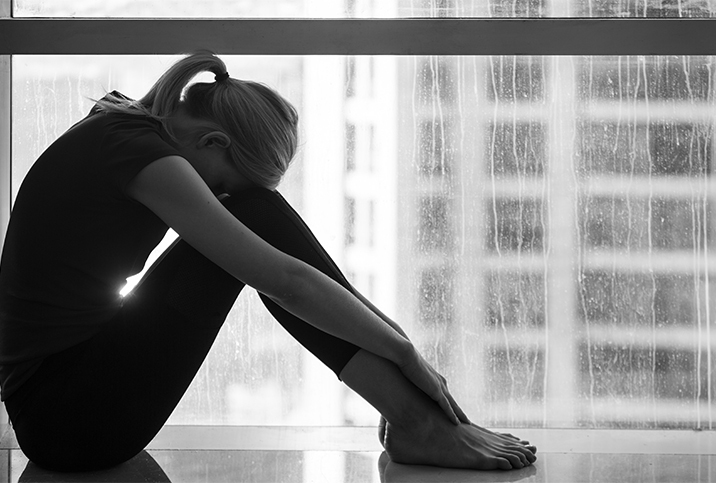Are You a Victim of Indecent Exposure? Here's What You Should Know

Recently, I was propped up on a beach somewhere in the South. It was my friend's bachelorette party weekend, and I had taken a few days off work and was bathing in the sun before heading back to Chicago, where the cold would whip my face.
I was reading a book, content with the empty shore surrounding me. "Not a soul in sight," I texted my friends in our group chat. Behind me was a small wooded area and in front of me was the ocean. I was there for a little more than an hour, eyes sluggish and relaxed, when suddenly, I turned over from my stomach to my back and directly above me was an entirely nude person jacking off.
How did I become a victim of indecent exposure?
Indecent exposure isn't rare. In fact, people like me who live in an urban environment tend to hear about these instances with a casual flair. This form of assault is often downplayed as humorous: "Ah, just another public masturbator."
Sure, we know it's terrible—we find it vile and inhuman—but we tend to brush it under the rug as just another casual sex crime. When I told my friends what happened, I made it a joke. Maybe it's funny. Maybe it's just my overwhelming trauma coping mechanism.
It wouldn't be until hours later that I realized how terrifying my experience was. The wooded area was an easy access point. He could have easily pulled me into the foliage and assaulted me. He could have just as easily attacked me physically out in the open, too.
When I finally made my way back to my Chicago apartment, I focused on the "Why?" What is the purpose of indecent exposure? What desire washes over someone so intensely that they can't help but traumatize another person and yet not take it a step further?
Why do some men expose themselves?
Known as Lady Godiva syndrome, apodysophilia, or "flashing," exposing yourself to another person—and getting caught—is a psychological desire called "exhibitionism." The Merck Manual describes it as something that usually starts in adolescence and noted about 30 percent of sex offenders are also exhibitionists.
"Exhibitionism is categorized as a paraphilic disorder marked by the urge, fantasy and subsequent act of exposing one's genitals to unsuspecting or nonconsenting adults or children, most oftentimes strangers," explained David A. Landry, Psy.D., a licensed clinical psychologist and certified sex offender treatment specialist from Florida.
People who expose their genitals usually become sexually excited when surprising a stranger—the shock value and look of surprise is what they're after. It's all about power less so than sexual contact. Offenders who expose their genitalia don't see anything wrong with their actions because they aren't physically abusing anyone. They walk the fine line of assault and harassment.
Offenders who expose their genitalia don't see anything wrong with their actions because they aren't physically abusing anyone.
"While many theoretical causes have been noted, offenders are often described as deriving a significant level of sexual excitement from the shock value the behavior causes," Landry said. "Biologically, studies have suggested that increased levels of testosterone may increase one's susceptibility to engage in sexually deviant behaviors, although a lot more data is needed in this domain."
We've heard of celebrities, such as Matt Lauer and Louis C.K., exposing themselves and masturbating in front of women. Others, like Richard Dreyfuss and Steven Seagal, allegedly couldn't keep their pants zipped, either.
These men in power, undressing in front of women, exhibit their narcissism by abusing their power, exposing their need for attention.
The stress of exposure
In a 2014 article in the Guardian, Laura Bates wrote about a group of teenage girls who told her that men masturbating in front of them on the underground rails was seen as "normal."
These experiences of being a woman and subjected to forms of assault and harassment are anything but normal. Even after my experience on the beach, I made light of the situation only to realize later I felt violated and afraid. Suddenly, I felt guarded and worried it would happen again.
"In the case of unwanted sexual exposure, there is a loss of safety and trust," said chief projects officer Sean Black, of the Illinois Coalition Against Sexual Assault. "A survivor may not feel safe doing the normal, everyday things that they once did. Going to the grocery store, riding public transit, walking down a school hallway or wherever the violence occurred, the victim having to revisit those places can be traumatic."
Landry agreed: "Anytime an individual experiences something that may be perceived as shocking or unexpected, especially in the case of being a victim of [a] sexually related offense, there is a chance a stress-like reaction occurs. The 'startle response' can be exaggerated, and emotionally, avoidance behaviors are activated in an effort to avoid being in situations where similar outcomes may occur."
Sitting in the airport on my way back home a few hours after the incident, I felt on edge. I was worried another strange interaction would send me whirling into an unsafe scenario—every man's presence left me feeling uneasy. "Not a soul in sight" resounded in my head.
Legally, what can victims do about indecent exposure?
According to the Everyday Sexism Project database, 525 women and girls reported being exposed to public masturbation from 2013 to 2014 in the United Kingdom. Many more victims may feel helpless or frozen in fear, unable to report what happened.
This crime, fueled by power, control and manipulation, gives the assailant ownership of the entire situation, especially the bodies of the women they are confronting.
Louis C.K., in his official statement about his misuse of power, said, "What I learned later in life...is that when you have power over another person, asking them to look at your dick isn't a question. It's a predicament for them." For many offenders, this abuse of power—and complete lack of respect for another person—comes with little to no penalty. How can these men be charged and punished for their wrongdoings when many of them flee or, as in C.K.'s case, are a person of authority and privilege?
"Engaging in exhibitionistic or other types of indecent-exposure-type behaviors does constitute a criminal offense that impacts societies and individuals alike," Landry said.
Laws and penalties pertaining to public indecency vary throughout the country. Where I'm based in Illinois, the state law says it's a criminal offense to expose oneself—with jail time and a maximum fine of $2,500. Proving the crime is more complicated, however.
Many assaults happen when no one else is around, or the assailant runs away before they can be caught. It's difficult to apprehend someone in the situation, especially if it happens quickly.
It is an intense psychological impact, being forced to watch or see something that you didn't want to see while your safety is at risk.
"The legal recourse will differ depending on the state the survivor lives in," Black said. "I would recommend connecting with the local rape crisis center to determine what laws are applicable where the survivor lives."
Landry said a concern about public indecent exposure is that it has "been identified as a precursor to more serious categories of offending, and through early identification and intervention, more education on the possible development and course could assist in the reduction of sexual violence and provide for more robust treatment options," he said.
The trauma experienced by indecent exposure is incredibly real. I remember feeling a bit off—wondering why I had such a gut-wrenching reaction when I was lucky I was okay and wasn't harmed. But it is an intense psychological impact, being forced to watch or see something that you didn't want to see while your safety is at risk.
"One thing to remember is that not all victims will react the same," Black said. "There is no set way to react to being a survivor of sexual violence. Each survivor is unique. Each survivor may be triggered by something different. It is important to treat each person in a victim-centered manner."

















